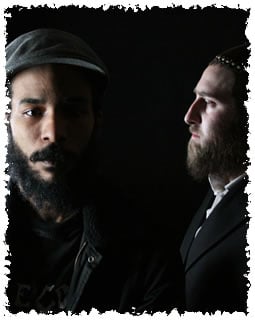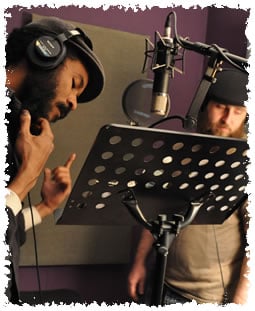Chabad.org & the Change MCs
This article just got published on Chabad.org Check it out, it’s well interesting….

Despite all this, they recently teamed up to release the four-song EP, Change, named after their first single. Within one month, the video of their first video shot up to forty thousand hits. As each song has been released, their popularity has increased markedly.
What brought these two polar opposites together? And why have they managed to make music that seems to be so broadly popular?
Let’s start at the beginning.
DeScribe
Shneur Hasofer, aka DeScribe, born in 1982, was brought up in Chabad family in Australia. Despite his traditional upbringing, DeScribe quickly became fascinated by the world around him. “When I was younger, I was very energetic, and I was very curious. When I was being taught about G‑dliness, I learned a lot of truth, but I couldn’t see that which was being taught. When I had questions, the answers weren’t necessarily the things I wanted to hear.”
DeScribe quickly began to
“You can’t hide from G‑d. So what are you hiding for?”
fall away from the world that he was brought up in and began exploring the world that surrounded him. Within no time, DeScribe became a street kid, “involved with some not good people,” as he recalls.
At fourteen he moved away from home. He flew across the world to Israel. Despite being in the Holy Land, he got involved with “more hardcore people.”
Even after he joined the army at seventeen, his life seemed to continue to spiral. When he left, he was simply better at what he was doing before…
It took a moment of epic proportions to shake DeScribe and bring him back to his roots.
The details of DeScribe’s descent are murky,
but one thing is clear: “Everything was yanked from me in an instant,” he says. After so many years of leading a shady, dangerous and hardcore life, DeScribe’s life caught up with him.
Although this moment of agony and danger might have broken someone else, DeScribe saw it for what it truly was: a chance to start over. He realized that now that he had nothing, he no longer had to hide. “You can’t hide from G‑d. So what are you hiding for? Go out and enjoy the sunshine!”
This moment flipped from DeScribe’s worst moment to his best. “I started being true to the truth of this world,” he explains. “After being close to not having anything, I started appreciating everything in my life.
“A little prayer of Shema used to send me into ecstasy.”
Riding his wave of euphoric connection to G‑d, DeScribe immediately began studying at Yeshiva, relearning everything he had left behind.
“I took out my earrings, I took out my tongue ring… I came in a ripped beast, a bouncer from a club, and I broke down into a million pieces.
“From there I built myself solid.”
Despite stories about falling apart as he prayed, breaking down and crying multiple times, and feeling regret over his decisions in life, DeScribe still sees that time as the best time of his life. “I’ve vowed never to forget it,” he says.
With his new life and newfound relationship with G‑d, DeScribe began his journey towards sharing the truth he experienced with the world at large.
Y-Love
Y-Love, aka Yitzchak Jordan, on the other hand,
“I saw a commercial when I was seven years old that said ‘Happy Passover.’ I told my mother, ‘I want to be Jewish.'”
had no Jewish roots growing up. Except for his grandmother, who had an odd fascination with Judaism, he grew up as a normal kid from East Baltimore. His father was Ethiopian and his mother Puerto Rican. Despite all this, Y-Love knew his destiny from an early age: “I saw a commercial when I was seven years old that said ‘Happy Passover from Channel Two,’ and I told my mother, ‘Mom, I want to be Jewish.'”
Despite the protests from his mom and the doubts cast upon him by the world at large, due both to his age and race, Y-Love soldiered on, committed to becoming an observant Jew.
“Judaism was something I always grew up believing. It was never a question for me.”
At age fourteen, Y-Love began attending a synagogue, but his request to convert was turned down due to his age.
It was not until he turned twenty one, fourteen years after he first saw the Passover commercial, that Y-Love officially converted after moving to New York.
But his life as a Jewish rapper didn’t begin until he attended yeshiva in Israel.
Y-Love’s difficulties always seemed to come from the world at large from the very beginning. He never had trouble with his drive to be an observant Jew. It just seemed that other people did instead. From when he first tried to convert to after he had fully converted.
And so, for Y-Love, there’s an added element inherently connected to his message. “There’s a commonly believed lie in America that Jew equals white.” Y-Love became determined at an early point to make sure that the world understood that, “even if you’re a black kid in East Baltimore, that doesn’t impact the fact that you still have a Jewish identity.”
Y-Love’s journey has been to a large degree shaped by his being a misfit. But it was this exact quality, combined with the drive that motivated him to become Jewish in the first place, that eventually fueled his success as a rapper.
Breaking Through
Like most spiritual hip-hop artists, DeScribe’s relationship with rap began before he became observant. Since he was young, he always really liked hip hop, but it wasn’t until he moved to Israel, of all places, that he actually began creating it himself.
“I was very hooked up with the hip-hop scene because I was a bouncer,” he recalls. As a bouncer at a club, DeScribe was able to meet many famous hip-hop artists. Eventually, he was introduced to Remedy from the Wu Tang Clan. “I toured with him and hung out with him at his place all the time.” Remedy taught him how to produce his own music and how to write raps. DeScribe quickly picked up the art form.
When DeScribe arrived at yeshiva, rather than giving up on his love of hip-hop, he nurtured his skills by using a friend’s computer. “He had a studio program on it and I started making music on it and it turned out to be really good.”
Eventually, the friend left, along with the computer, and DeScribe had to find a way to keep making music. He took two months off from yeshiva, and, “Miraculously, I ended up with all the equipment I needed for a professional studio. I filled a whole room up with expensive, expensive equipment.
“And that’s basically when I became DeScribe.”
Y-Love yet again bucked the system. He was not even interested in hip-hop before he became religious. “I grew up listening to metal and punk rock. I would have been more likely to throw Pantera in a CD player than Tribe, probably.” Hip-hop was just too mainstream and boring.
Until, he got to yeshiva.
Y-Love started to see how hip-hop could be a creative endeavor used to elevate the soul.
“I then got into this thing called underground hip-hop,” he explains. Suddenly doors opened up to him and he started to see how hip-hop could be a creative endeavor used to elevate the soul, not degrade it. In fact, his first chavruta (study partner) was a rapper. They used to freestyle as a way to learn the Talmud. Learning was like a full out, full on creative endeavor.
Y-Love learned hip-hop and Talmud together, and so to him there was no contradiction between the two. One complemented the other. He claims that to this day, he can pick up a Talmud and know what he learned because of his method.
“Learning Torah isn’t like anything else. Hip-hop was the way to keep all that in order.”
And so when Y-Love left yeshiva he made it his mission to help others connect in the same way he did. He decided that others could benefit from connecting to G‑d through hip-hop.
The Collaboration
A few months ago, Erez, the head of Shemspeed, Y-Love’s record label, contacted DeScribe about working together. Within no time, DeScribe signed to their label and immediately began collaborating with Y-Love.
At first, the pairing seemed odious. As Y-Love put it, “DeScribe and I come from such drastically different points of view. We agree on very very little. Here I am a progressive, super social liberal and DeScribe told me he served in the IDF on the front lines.”
However, as soon as the two began collaborating, their differences were exposed for what they were. According to DeScribe, “We’re both preaching for goodness and a better world.” Their differences soon turned into an asset rather than a liability, as their art went from contradictory to complementary. “As the album has progressed, it has turned into a conversation.”
DeScribe laid out how Y-Love and he hope to accomplish with their four song EP and in their careers in general: “Instead of using it to tranquilize people, we basically take the same music, that heavy power that’s possessed in the music, and give it its true soul.”
Together, both the rappers combined their unique gifts and viewpoints to create a music both deep and accessible to their listeners.
Who are these listeners? Their vision reaches further than one might expect.
Obviously, they are very interested in speaking to their Jewish brethren. In a world that can easily distract them from G‑dly matters, the two hope to create a world where, “the learning is Torah and the diversion is also Torah.”
But in the end, their ultimate goal is even larger. They are looking to totally turn the world inside out. Both of them have a vision of infusing not just Jewish hip-hop but a true understanding of G‑d within the world.
“We try to give out a message that
“You have a mission. And your mission is sacred.”
is global, whether you are an Arab or a Jew, whether you are a Christian or a Muslim. It doesn’t matter.” Because both of them come from such drastically different places, their shared vision has become a reality.
As DeScribe put it: “When you do the right thing, it’s real. And real things last forever. And fake things are born today and die tomorrow.”
Suddenly, listening to hip-hop doesn’t have to mean degrading women or worshipping drugs and money. It came mean more. With artists like DeScribe and Y-Love transforming and elevating the scene, hip-hop’s and the world’s true reason for existence are beginning to shine.
“Finally people get to wake up to music that tells them, ‘It’s a beautiful world, it’s an amazing place, open up your eyes, see the sun shining. There’s a real reason why you’re born. You have a mission. And your mission is sacred.'”
– full article, here.
